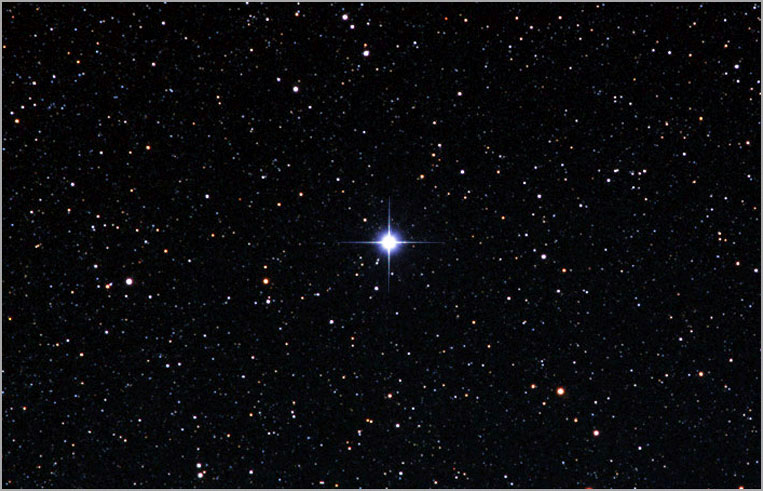O primeiro a ver [Aquiles] com os olhos foi Príamo, o ancião:
viu-o refulgente como um astro a atravessar a planície,
como a estrela que aparece na época das ceifas, cujos raios
rebrilham entre os outros astros todos no negrume da noite,
estrela a que dão o nome de Cão de Oríon.
É a estrela mais brilhante do céu, mas é portento maligno,
pois traz muita febre aos desgraçados mortais.
Ilíada, XXII, vv25-29, Frederico Lourenço (trad.), Cotovia (2005)
Τὸν δ' ὃ γέρων Πρίαμος πρῶτος ἴδεν ὀφθαλμοῖσι
παμφαίνονθ' ὥς τ' ἀστέρ' ἐπεσσύμενον πεδίοιο,
ὅς ῥά τ' ὀπώρης εἶσιν, ἀρίζηλοι δέ οἱ αὐγαὶ
φαίνονται πολλοῖσι μετ' ἀστράσι νυκτὸς ἀμολγῷ,
ὅν τε κύν' Ὠρίωνος ἐπίκλησιν καλέουσι.
λαμπρότατος μὲν ὅ γ' ἐστί, κακὸν δέ τε σῆμα τέτυκται,
καί τε φέρει πολλὸν πυρετὸν δειλοῖσι βροτοῖσιν·
Não vês? O cavalo de corrida
é venético. Mas o cabelo
da minha prima
Hagesícora floresce
como ouro puro.
Seu rosto é de prata.
Mas por que te digo isto às claras?
Esta aqui é Hagesícora;
ela, segunda em beleza depois de Ágido,
correrá como um cavalo da Cítia contra um da Lídia.
As Plêiades, enquanto nós
levamos um arado até Órtria,
sobem através da noite imortal
como a estrela Sírio e lutam contra nós.
Álcman, fr.1 PMG 50-63, Poesia Grega. Frederico Lourenço (trad.), Cotovia (2006)
ἦ οὐχ ὁρῇς; ὁ μὲν κέλης
Ἐνητικός· ἁ δὲ χαίτα
τᾶς ἐμᾶς ἀνεψιᾶς
Ἁγησιχόρας ἐπανθεῖ
χρυσὸς [ὡ]ς ἀκήρατος·
τό τ’ ἀργύριον πρόσωπον,
διαφάδαν τί τοι λέγω;
Ἁγησιχόρα μὲν αὕτα·
ἁ δὲ δευτέρα πεδ’ Ἀγιδὼ τὸ Fεῖδος
ἵππος Ἰβηνῷ Κολαξαῖος δραμήται·
ταὶ Πεληάδες γὰρ ἇμιν
Ὀρθρίᾳ φᾶρος φεροίσαις
νύκτα δι’ ἀμβροσίαν ἅτε σήριον
ἄστρον ἀυηρομέναι μάχονται.
When in Egypt the early rising of Sirius became the beginning of the year, the approach of a better season could be foreseen by the first setting of the Nile. Yet this was also the time of the most dangerous heat: a highly ambivalent season! [Sírio desaparece do firmamento por 70 dias antes do solstício de Verão.] The same was true in Crete and Greece (with the exception that there was no Nile). The heat was obviously evil, and so was the star with whose appearance it began. But in a mysterious way the season was also good. In Greek it was called opora, a word that is not easy to translate because it means noy only the season but its fruits as well.
Carl Kerényi. Dionysos: Archetypal Image of Indestructible Life. Ralph Manheim (trad.), Princeton University Press (1976)




Sem comentários:
Enviar um comentário